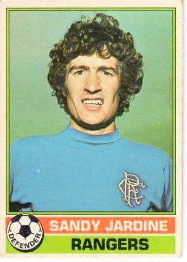Emdad Rahman: The first time I came across William Pullar (Sandy) Jardine was when I collected his Panini sticker when I was a youngster. The Scotland icon was a star veteran at Hearts of Midlothian at the time and soon to become joint manager. He was born near Tynecastle but was discovered as a football prodigy by Glasgow Rangers. The name Sandy came about as a result if the colour of his hair.
Jardine, who clocked 171 consecutive league games between April 27 1972 and August 30 1975, featured in two World Cups for the Tartan Army, being named in the 1974 World Cup XI. During a dazzling career he won three Leagues, five Scottish Cups and five League Cups as well as the European Cup Winners Cup. The attacking forays of the Gers and Jambos legend were equivalent and even superior to the modern day wing back. He was majestic in possession, intelligent and composed in defence and attack. Jardine possessed finishing skills that was the envy of top strikers and occasionally switched to a striking role throughout his career, often scoring some brilliant goals. At the 1974 World Cup, the man chosen twice by Scottish football writers as their player of the year was recognised, along with Danny McGrain, as the best full back in the world.
He represented Scotland 48 times, nine as captain. Jardine, who was a member of the famous Rangers sides that won the domestic treble in 1975-76 and 1977-78 was one of Scotland’s most notable Total Footballers. The 2006 inductee into the Scottish Football Hall of Fame was able to effortlessly switch between various positions on the field of play. His stomping attacking runs from defence were a feature of his play and his versatility was second to none. Jardine’s greatest moment arrived when he scored a semi final goal as Rangers defeated Bayern Munich en route to lifting the 1972 European Cup Winners’ Cup Final, beating Moscow Dynamo 3–2 at the Nou Camp in Barcelona. The semi win was revenge for the 1-0 1967 European Cup Winners’ Cup Final loss to Bayern to a Franz Roth goal at the Nürnbergerstadion in Nuremberg. Jardine’s performance during that defeat provoked lavish praise by none other than Franz Beckenbauer.
In 1981-82 John Greig fulfilled Jardine’a wish to end his career at his hometown club and so he joined Hearts to enjoy an Indian summer during the twilight of his career. As an accomplished sweeper Jardine spearheaded Hearts push to break the Old Firm stranglehold and came agonisingly close in 1985-86, finishing runners-up in both the Championship and the Scottish Cup. Jardine was honoured with the title of Scotland’s Player of the Year. He was 37 and it was the second time he had received the award. His good friend John Greig had been the first to win the accolade twice but Jardine was the first to receive it with different clubs.
 East London News A Force for the community…
East London News A Force for the community…




